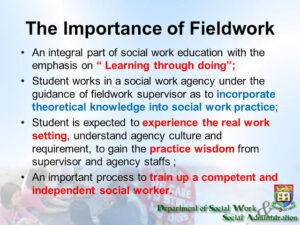Back to: Environmental Biology 200 Level
Welcome to class!
Hello great learner! Have you ever noticed how much better we understand things when we see them in real life rather than just reading about them? That is why fieldwork is so powerful. Today, we’ll learn about Student Fieldwork Presentations — how students observe the environment, gather data, and share their findings with others in a meaningful way.
Student Fieldwork Presentations
What is Fieldwork?
Fieldwork is learning and gathering information outside the classroom, in real environments like forests, wetlands, farms, or communities. For environmental biology, fieldwork allows students to study ecosystems, collect samples, and observe plants, animals, and human activities affecting nature.

Why is Fieldwork Important?
It helps students apply what they learn in class to real-world situations.
It builds skills in data collection, observation, and analysis.
It teaches teamwork and problem-solving.
It connects students to their environment, making them more responsible citizens.
What are Student Fieldwork Presentations?
After fieldwork, students share their findings, research, and recommendations with their class, lecturers, or community. These presentations help others learn from their field experiences and encourage solutions to environmental problems.
Steps in Preparing Fieldwork Presentations
Plan Your Fieldwork: Decide on the location, purpose, and questions you want to answer. For example, studying pollution levels in a nearby river.

Collect Data: Use tools like notebooks, cameras, water or soil test kits, and GPS devices to gather information.
Organise Your Findings: Arrange your notes, data, photos, and samples clearly.
Create Your Presentation: Use charts, maps, and slides (e.g., PowerPoint) to make your report engaging.
Share Your Ideas: Present confidently, explain your findings, and answer questions.
Examples of Fieldwork Topics in Nigeria
Measuring the impact of oil spills on mangroves in the Niger Delta.
Analysing waste management practices in Lagos markets.
Observing biodiversity in the Hadejia-Nguru wetlands.
Studying soil composition on farms in Benue State.
Tips for Effective Fieldwork Presentations
Use clear and simple language everyone can understand.

Add pictures, diagrams, or short videos to show your findings.
Work in teams and divide speaking roles.
Practise before the presentation day to build confidence.
Summary
- Fieldwork is real-life learning outside the classroom.
- Student fieldwork presentations share findings and environmental solutions.
- Preparing involves planning, data collection, organising, and presenting.
- Effective presentations use visuals, teamwork, and clear communication.
Evaluation
- What is fieldwork?
- Mention two reasons why fieldwork is important.
- List three steps in preparing a fieldwork presentation.
- Give one example of a fieldwork topic in Nigeria.
You are doing exceptionally well! Fieldwork presentations will not only sharpen your communication skills but also make you a voice for environmental change in your community. Afrilearn is proud to guide you on this journey!
